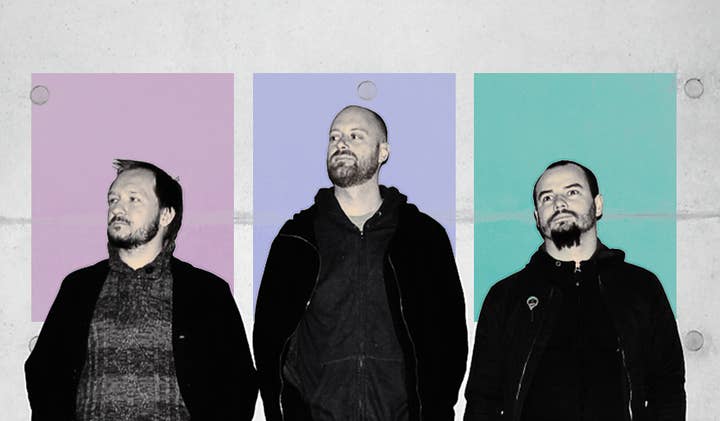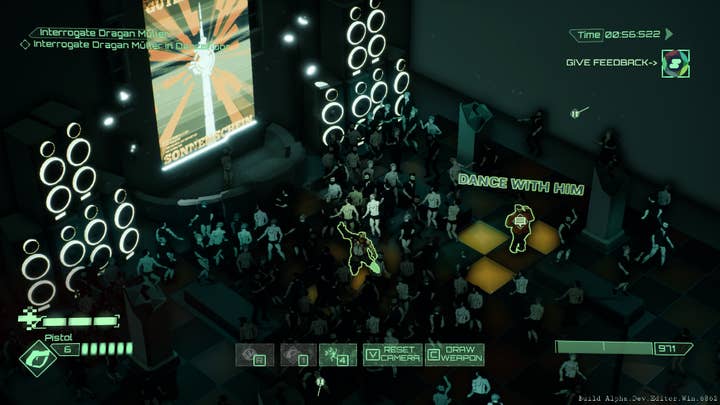Inbetween Games' debut is a tribute to Berlin's diversity
With All Walls Must Fall, a team of ex-Yager devs have captured the energy and inclusivity of the German capital
Today, games are made all over the world. Thanks to the proliferation of accessible production tools and open storefronts, you can find developers everywhere from Seattle to Siberia.
However, despite this broad geographical spread, the proportion of developers that use local culture in their work remains strangely and disappointingly small; the aversion to embracing regional identity a possible consequence of trying to appeal to as many people as possible, in a marketplace where finding an audience of any size can be extremely difficult.
Inbetweengames' debut project, All Walls Must Fall, is different, speaking loudly and clearly of the city in which it was created: Berlin. An action tactics game at its core, All Walls Must Fall incorporates both the difficult past of Germany's capital, and the vibrant energy that has drawn so many to the city over the last 20 years.
"Whenever Berlin is used in games it's a very classical, historical setting and perspective... We wanted to reflect the city we live in"
The end of the Cold War ushered in a new, exciting era for East Germany, but in the world of the game the Berlin Wall never fell; the city remained divided for another century. However, one aspect of modern Berlin remains absolutely vital to inbetweengames' noir-ish take on its home city: its nightclubs, and the inclusive attitude towards gender and sexuality that exists within them.
When I met with Isaac Ashdown and Jan David Hassel - two of the studio's three founders, and its programmer and designer respectively - they made it clear that using Berlin as a location was among the first ideas on the table when the studio formed, as was making the culture of its dance clubs as fundamental to the gameplay as it is to the city.
"It's a culture that I'm exposed to on a somewhat regular basis, and it's one that I know people come to the city for; it has that reputation," Ashdown said. "We wanted a game set in Berlin, because we feel it's an underused setting in general. And whenever Berlin does get used in games it's a very classical, historical setting and perspective; it's either set during the Second World War or the [historical] Cold War, but we wanted to reflect the city we live in, the contemporary version of Berlin."

"We're all immigrants to the city, but we've all been living here longer than anywhere else we've ever lived," Hassel added. "It's a great place to show off, and because we wanted to do this thing with the music the club scene was an obvious fit."
In All Walls Must Fall, the player pauses the action while they decide their next move, a phenomenon explained through the time-bending powers of its cast of secret agents. When those decisions play out in real-time, everything the character does is synchronised with the music; movement, talking, opening doors, combat, hacking, all measured to the insistent beat of the soundtrack.
"We wanted to try and put different sub-cultures in the game, but right now it's kind of only one; it's all half-naked dudes"
The game's nightclub levels are randomly generated, but, more distinctively, they are populated almost exclusively by gay men. This is not integral to the game's plot exactly, but Ashdown said that it's a fact of the kind of spaces that inbetweengames wanted to represent in the game, and an essential part of Berlin's social culture.
"We wanted to try and put different sub-cultures in the game, but right now it's kind of only one; it's all half-naked dudes," he said, adding that the game's title implies the destruction of more barriers than just the Berlin Wall.
Right now, All Walls Must Fall is in Early Access, but it already serves up a beguiling combination of classic 90s PC games like Xcom and Syndicate, and its creators' personal feelings about the city in which they live. Both Ashdown and Hassel previously worked at another Berlin studio, Yager Development, on titles like Spec Ops: The Line and the aborted Dead Island 2. When the latter project fell apart and they were made redundant, Hassel said that, "it seemed like a good time and a place to try something different. If not now, then when?"
"In the end it was a good opportunity for us," he continued. "It gave us all a kick in the butt, y'know... If you're in a studio and you know a couple of people you'd like to start something with, to actually get on board and get everything synchronized at the same time? It was actually helpful like that."

The name, Inbetweengames, is a reference to the transition they were experiencing at that time: from employment to redundancy, from AAA to indie. "The kind of games that we want to make, they're going to be small," Hassel said. "But they're going to be between that and these giant other [projects], both in monetary budget and the kind of time attention that players have to give to them.
"The games that take 20 hours minimum, and more likely 40 or 60 - who has time to do that?"
"If nobody else does it, if nobody else makes it happen, you have to do it yourself"
The team found early funding through the Berlin-Brandenburg Medienboard, an government-funded organisation dedicated to promoting creative media in the region, and one for which both Ashdown and Hassel are full of praise. It then raised a further €36,000 through a Kickstarter campaign, after setting a target of €15,000. According to Ashdown, the plan was always to use open development platforms, culminating in its current open beta on Early Access.
"A big part of it is we've never been able to work outside of an NDA before," he said. "We were working for publishers, working for hire and stuff, so we couldn't talk about what we were doing... A real benefit that indies have is they can get a much wider pool of feedback than the just the same circle of usual suspects."
If all goes according to Inbetweengames' commercial plan, All Walls Must Fall's story will be told in three discrete parts: the first set in East Berlin's gay clubs, the second in the West, and the third presumably concerned with unifying the city's two halves. Both Ashdown and Hassel are well aware there are no guarantees in indie game development, but that was every bit as true of their previous employer, Yager.
"There's not a huge amount of AAA development in Germany in general, and the third-party studio model is a tough one to keep up," Hassel said. "It feels like it's indie or AAA, or whatever you want to call it, and the space in the middle gets harder and harder."
There was never a temptation to pursue another job in AAA, though, as that would have required giving up both Berlin and the freedom to pursue their shared personal vision. Inbetweengames is now a part of Saftladen, an indie collective based in the city, whose 13 members share a workspace, resources, advice, and support. It can take the decline of larger companies to give rise to these grassroots communities, and produce games like All Walls Must Fall, which stand apart from the crowd by expressing those ideals.
"It's home," Hassel said of Berlin's growing indie scene. "If nobody else does it, if nobody else makes it happen, you have to do it yourself."
